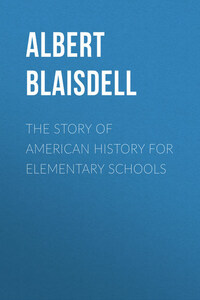Some sort of a first book on American history is now quite generally used in schools as a preparation for the more intelligent study of a larger and more formal text-book in the higher grammar grades.
For beginners, a mere compilation of facts is dry and unsatisfactory. Such books have now given place, for the most part, to those prepared on a more attractive and judicious plan. The real aim in a first book should be to interest boys and girls in the history of their country, and to encourage them to cultivate a taste for further study and reading.
This book is intended for use in the earlier grammar grades and to be preliminary to the study of a more advanced work in the higher grades. The author has also kept in mind the fact that the school life of many children is brief, and that all their instruction in American history must come from a text-book of this kind.
The author has not aimed to cover the whole range of our country's history. Of many noted men and important affairs no mention is made. Only the leading events of certain periods and the personal achievements of a few representative "makers of our country" are treated in any detail. The subject is approached through biographical sketches of a few of the more illustrious actors in our nation's history. Some prominence is given to exceptional deeds of valor, details of everyday living in olden times, dramatic episodes, and personal incident.
The schoolroom test demonstrates the fact that such a treatment of the subject is more attractive and profitable to children of the lower grades than the mere recital of minor matters and petty details of public events.
The author would acknowledge his indebtedness to Dr. Homer B. Sprague of New York City for editorial help in reading and revising the manuscript. Thanks are also due to Dr. John E. Sanborn of Melrose, Mass., for editorial assistance.
November, 1900.
Note. – The attention of teachers and pupils is especially directed to the practical usefulness of the subject of "Reference Books and Supplementary Reading for Successive Periods in American History," as treated on pages 424-435 in the Appendix.
CHAPTER I.
AMERICA IN THE OLD DAYS
1. The Story of our Country.– We are sure that every intelligent and patriotic American youth must like to read the story of our country's life. To a boy or girl of good sense no work of fiction can surpass it in interest or power.
How delightful to let the imagination summon up the forms and the deeds of the fearless Norse sailors who dared to cross the unknown seas in their frail and tiny vessels without compass and without charts! How interesting the oft-told but ever-fresh narrative of the intrepid Columbus and his memorable first voyage into and across the "Sea of Darkness"! What romance was ever more exciting than the stories of the fierce struggles between the white men and the Indians for existence and supremacy on this continent?
How deep the pathos of the simple tales that tell of the patient sufferings, the severe toils, the ever-present dangers, and the heroic self-denials of the early colonists in making for themselves homes in the New World! How richly suggestive are those pages that record the glorious events of our American Revolution – the splendid and immortal deeds of Washington and his illustrious associates!
Then there is the thrilling account of the most tremendous civil war in all history, with its four million soldiers, its two thousand battles, and its preservation of the Union.
And to come down to a time within the memory of every schoolboy, the echoes of the Spanish-American conflict have hardly yet died away. The story of this short war in the summer of 1898 still rings in our ears – with its astounding naval victories at Manila and Santiago, the freedom of Cuba, and the destruction of the last vestige of the once mighty Spanish supremacy on this western continent!
2. Lessons of Wisdom and Inspiration to be learned.– But beyond and above all mere gratification and pleasure to be derived from the study of our country's history, there are in it lessons of wisdom to be learned, there is inspiration to noble living, there is an uplifting of the soul to a higher plane of thought and sentiment, there is constant aid in the development and upbuilding of manly and womanly character.
And when we think of the marvelous growth of less than three centuries which, beginning with the infant colonies of Jamestown and Plymouth, has made us a nation of more than seventy millions; when we think of the wonderful record of trial and triumph and unceasing progress, and of the great and good and wise men that have laid the foundations and reared the superstructure of this mighty temple of liberty, – we must be blind indeed and ungrateful beyond expression not to recognize with devout thankfulness the guiding hand of a beneficent Providence.
America, under God, stood at Plymouth for religious freedom; in the Revolution, for independence; in our civil war, for the preservation of the Union. She now stands for humanity, civilization, and the uplifting of the whole race.








